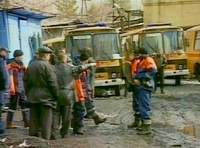Methane gas explosion kills 74 in Russian coal mine
Rescuers struggled to rescue dozens of workers caught underground in a Siberian coal mine Monday after a methane gas explosion killed at least 75 in Russia's worst mining disaster in a decade.

As many as 200 workers were in the Ulyanovskaya mine in the coal-rich southern region known as the Kuzbass at the time of the blast, which occurred early Monday at a depth of around 270 meters (885 feet), emergency and regional officials said.
Sergei Cheremnov, a spokesman for the regional government in Kemerovo where the mine is located, told The Associated Press that at least 75 miners were killed, with an unknown number of bodies brought to the surface. He said 75 people had been rescued and 50 others were still missing.
Rescuers were in contact with some surviving miners underground. It was unclear whether they were in immediate danger.
"Unfortunately, the conditions (in the mine) are very difficult," Emergency Situations Ministry spokesman Sergei Salov said in televised comments.
At least five miners were injured, but officials said three had been released from the hospital by Monday evening. Russian television broadcast footage of an injured miner, blackened and semiconscious, lying on a stretcher, being brought by ambulance to a hospital.
Cheremnov said that company officials were in the mine examining a British-made safety system on Monday, along with a British representative of the company that made the system. The British man and his interpreter are now missing, he said.
The massive mine located in the city of Novokuznetsk, about 3,000 kilometers (1,850 miles) east of Moscow, is operated by Yuzhkuzbassugol, an affiliate of Russian coal and steel company Evraz Group SA, which acquired a 50 percent stake in the company in 2005.
No one answered repeated calls to the company. However, company spokesman Eduard Sivtsov earlier told NTV that rescuers were checking a large section of the mine for survivors.
"Their work is complicated by a great number of obstructions," he said.
President Vladimir Putin ordered Emergency Situations Minister Sergei Shoigu to travel to the area, and the industrial regulatory agency Rostekhnadzor had sent investigators.
The incident was the latest to highlighted the precarious and hazardous state of Russia's mining industry, which fell into disrepair when government subsidies dried up after the Soviet collapse.
At least 30 workers died in Russian mining accidents last year, including 25 who perished in a fire at a Siberian gold mine. In 2004, a blast at a mine on the outskirts of Novokuznetsk killed 47 workers - the deadliest in the region since 1997, when a methane explosion at a mine in the city killed 67.
In recent years, conglomerates like Evraz SA have bought up coal mines and similar enterprises and consolidated operations, selling raw and semi-processed material to steel smelters, electricity producers and other major industry. But some government officials in the past have accused private companies of cutting corners on safety measures in order to cut costs.
According to the Evraz Web site, Yuzhkuzbassugol was Russia's leading producer of coking coal, comprising 24 enterprises, including nine coal mines, two enriching plants and other operations supplying coking coal to steel and byproduct plants. Yuzhkuzbassugol's total production in 2005 was 13 million metric tons (14 million U.S. tons) of coking coal and 4 million metric tons (4.4 million U.S. tons) of steam coal, the AP said.
Alexander Sergiev, chairman of the Independent Coal Miners' Union, said the Ulyanovskaya mine operated with new equipment, but he said that human and natural factors always created the potential for accidents. He said miners may have encountered a pocket of methane while working and he called for new safety regulations to help minimize the chance of such incidents.
"It's necessary, in my view, to pass legislation forbidding underground coal mining without the required (ventilation) from the surface for methane," he said in comments to Ekho Moskvy radio.
Sergiev also blamed the blast on quota systems that encourage miners to work faster and harvest more coal, potentially leading to careless and fatal errors.
Kemerovo Regional Governor Aman Tuleyev was quoted by ITAR-Tass as saying that families of the dead would each receive at least 700,000 rubles (US$25,000; EUR 19,000) as compensation.
Subscribe to Pravda.Ru Telegram channel, Facebook, RSS!


